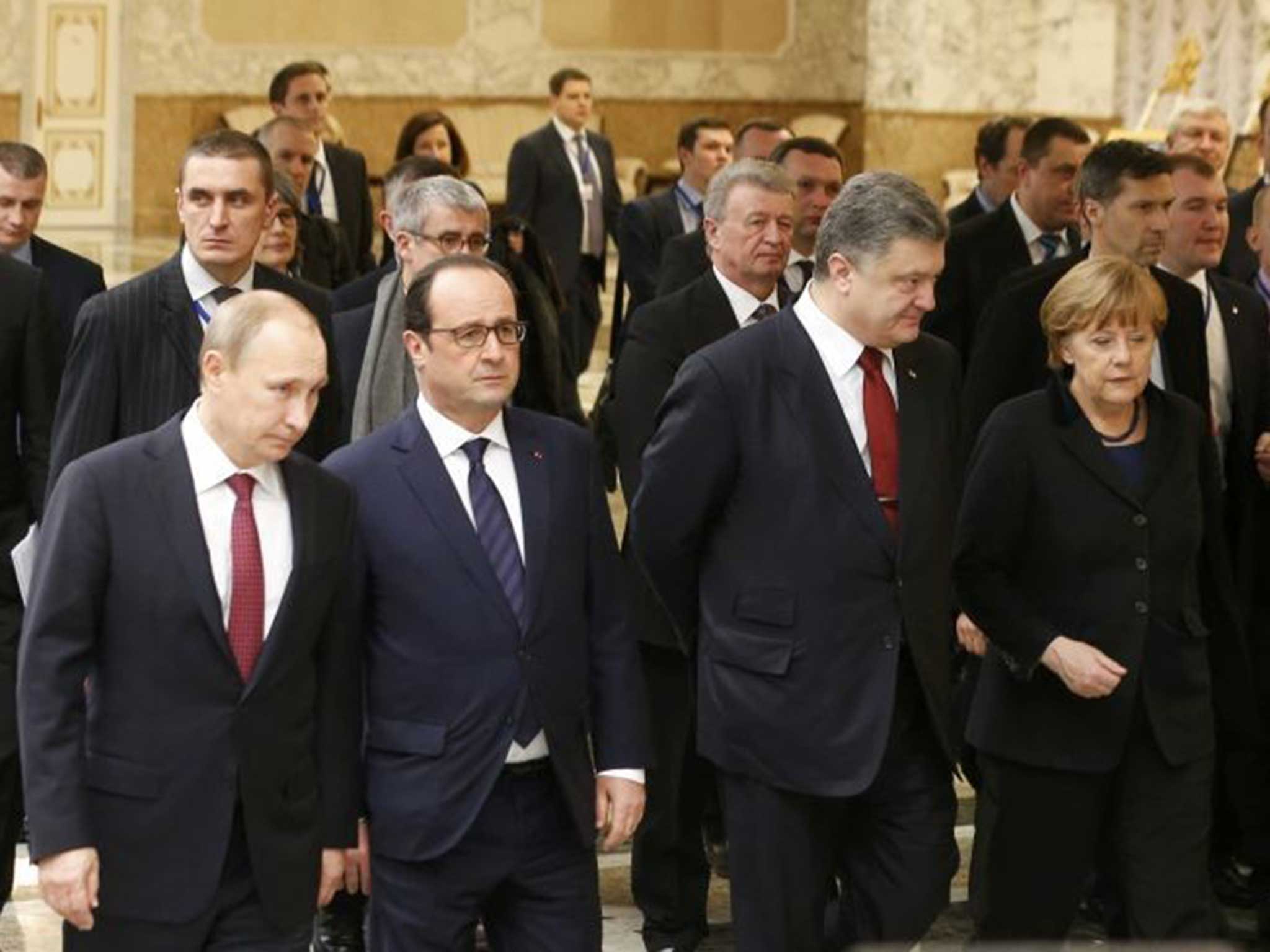Ukrainian crisis: Ceasefire agreed as Russia launches military exercises – across 12 regions
Germany's Chancellor Angela Merkel and France's president Francois Hollande were also in attendance

Your support helps us to tell the story
From reproductive rights to climate change to Big Tech, The Independent is on the ground when the story is developing. Whether it's investigating the financials of Elon Musk's pro-Trump PAC or producing our latest documentary, 'The A Word', which shines a light on the American women fighting for reproductive rights, we know how important it is to parse out the facts from the messaging.
At such a critical moment in US history, we need reporters on the ground. Your donation allows us to keep sending journalists to speak to both sides of the story.
The Independent is trusted by Americans across the entire political spectrum. And unlike many other quality news outlets, we choose not to lock Americans out of our reporting and analysis with paywalls. We believe quality journalism should be available to everyone, paid for by those who can afford it.
Your support makes all the difference.A battle of nerves ended this morning as the Russian and Ukrainian leaders agreed to a ceasefire in Belarus over contested territory in the embattled eastern European state.
Russian president Vladimir Putin announced the ceasefire would be effective from midnight 15th February, bringing hope to a conflict that has claimed the lives of more than 5,400 people.
It brings an end to tense 16-hour talks with the French and German leaders.
Meanwhile, reports have emerged this morning that Russia has launched military exercises in 12 regions, involving more than 30 missile regiments, according to a Russian defence ministry official.
More than 5,400 people have died in the civil conflict between pro-Russian separatists – armed by the Kremlin – and Ukrainian nationalists. Russia has always denied claims it provides arms or troops to the separatists.
Russian president Vladimir Putin greeted Ukrainian president Petro Poroshenko coldly yesterday, foreshadowing the icy nature of the talks.
Tensions escalated after president Poroshenko allegedly stormed out of the meeting hall briefly after an “emotional conversation” with Mr Putin, Russian media reported.
Eyebrows were also raised after pictures emerged that appeared to show Mr Putin snapping a pencil during talks.
Germany’s Chancellor Angela Merkel, one of the few Western leaders respected by Mr Putin, and France’s president Francois Hollande also attended the talks.
Crowds of reporters waited outside the negotiation hall, with tensions from inside the hall radiating out to waiting journalists.
Local news channels reported various fracases between partisan journalists from both sides, with one Russian reporter - known for his close ties to the Kremlin - snapping at a female Ukrainian journalist who asked about his accreditation.
Hope remains limited. Many observers acknowledge the best case scenario would be for an agreed ceasefire, which will depend heavily on how far president Poroshenko’s is willing to accept a compromise – and what Russia will offer.
Prior to the start of talks yesterday, the Ukrainian leader appeared unoptimistic.
"The entire world is waiting to see whether the situation moves toward de-escalation, weapons pullback, cease-fire, or ... spins out of control," he told reporters.
Even as the leaders fight, real battle still rages across corners of the fractured country.
The United Nations reported that between 31 January and 4 February an estimated 263 civilians were killed.
What are the key sticking points of the deal?
- New lines in the mud: There will be intense discussion around the changing of border lines. Russia wants to honour the rebels advances, while Ukraine is keen to stick to those drawn up in September – crucially before pro-Russian advances.
- Withdrawal of Kremlin-backed soldiers and weaponry: Russia has consistently denied that it possesses any troops in the area. A stance that Ukrainian leaders – and western observers, such as NATO – say is discredited.
- Secure borders: Kiev needs to maintain control of Russian borders to halt the flow of troops and missiles into the country. Russian leaders claim control of the borders rests with those who hold them – in this case rebel forces.
- Separatist autonomy: Russia is demanding guarantees of the broader rights of pro-Russian or separatist Ukrainians living under the Kiev government. Ukrainian officials claim their rights are protected under already existing law.
- Finally, Russia needs Ukraine to end its financial blockade of the east.
Additional reporting by Associated Press
Join our commenting forum
Join thought-provoking conversations, follow other Independent readers and see their replies
Comments